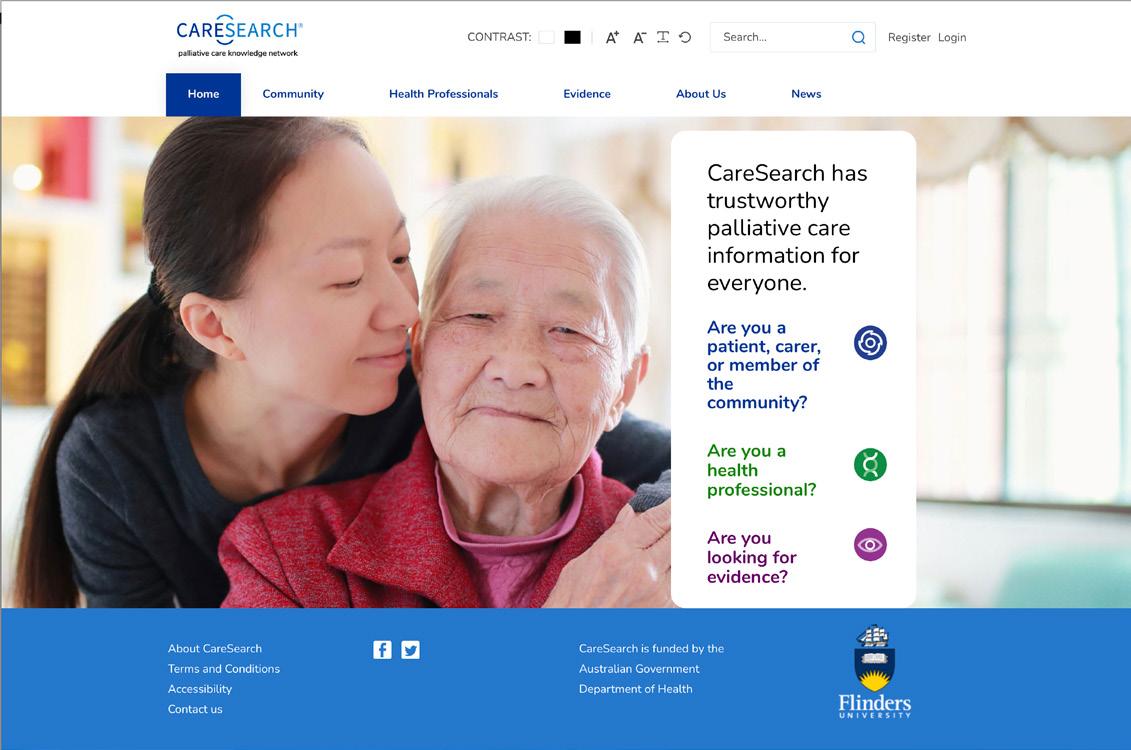
10 minute read
Community Reports
Voluntary Assisted Dying Bill (NSW) 2021
The VAD Bill was presented to NSW parliament on Thursday 14th October 2021 by Independent Member for Sydney Alex Greenwich MP. In preparation for the introduction of this Bill, PCNSW met with Mr Greenwich to present our position on VAD and palliative care. We specifically requested additional support for palliative care to respond to and adapt to this new legislation if VAD becomes legal in NSW. We also requested that language used during debate not be discriminatory or inflammatory, nor emotionally charged, out of respect for those living and dying with a range of life limiting conditions.
Advertisement
PCNSW supports the position of PCA that the decision whether or not to legislate voluntary assisted dying is one for governments. PCNSW neither advocates for, nor argues against, the legislation of voluntary assisted dying.
Our position is to promote the role of palliative care in a person’s end of life experience. Definitions: Palliative care: Affirms life and regards dying as a normal process that intends neither to hasten nor postpone death. It improves the quality of life of patients and their families through the prevention and relief of suffering by means of assessment and treatment of pain and other problems, physical, psychosocial and spiritual. Voluntary assisted dying: Medical practitioners may prescribe and potentially directly administer an approved substance for the purpose of causing death where the person meets the eligibility criteria outlined in the relevant legislation and has sought this outcome voluntarily.
We have also written to NSW Premier Dominic Perrottet, the Deputy Premier, the Treasurer and Minister for Health. Our primary focus is the request for equity of access to, and information about, palliative care and an investment commitment to support the sector to respond and adapt to this new legislation, should it come to pass. We will keep you updated.
In the meantime, members can access current information and provide your own comments and insights through our VAD website forum. Simply visit your Members Only page:

Click on: > ‘Let’s Talk About’ > ‘Voluntary Assisted Dying’
Funded by the Australian Government Department of Health
PEPA PLACEMENTS
We are looking forward to PEPA NSW placements recommencing once restriction ease and very excited to get back to face to face education sessions as soon as we can. We’ve not been idle during lockdown though and you should pop onto the PEPA Education webpage to take a look at the updated documents/modules/resources/links. If you are interested in undertaking a PEPA placement I encourage you to apply via the webpage as soon as possible so we can start planning.
THE PEPA MENTOR HUB
The PEPA Mentor HUB is enjoying success. PEPA has established a stronger connection to mentoring in palliative care. The PEPA Mentor HUB has been re-booted and commenced monthly one hour webinar sessions online. The sessions have had attendance from PEPA mentors from all over Australia. PEPA understands that mentors are busy clinicians, so the sessions have been recorded for people to watch later for their continual professional development. The sessions recorded have been Imposter Syndrome, Reflective Practice, Positive Mind setting, and Psychological Safety. On 13th October, 5–6 pm we will discuss Emotional Intelligence and if you want to join us contact PEPA at pepa@qut.edu.au and we will send you an invite. The sessions have evolved from requests made by clinicians during PEPA mentoring workshops. If you want to watch past episodes and attend the CPD for your professional development you can sign up to PEPAs free learning management system to access the materials and created your Certificates of Participation. You can learn more about how PEPA is focused on supporting clinicians to feel more confident in their own mentoring capability. The September session was Psychological Safety and as a group of mentors we had great discussions about how we feel in our organisations in regards to Psychological Safety and how we notice other colleagues and their Psychological Safety. We did edit some of the content as confidentiality is vital to us when we attend the session live (to care for self). You can access the links to sessions on our website in Mentor News. Keep an eye out on the Mentor news site. If you would like to join the PEPA mentor hub and evolve your mentor abilities, please register via this link.


Palliative Care Outcomes Collaboration
The latest PCOC Outcomes Reports have recently been distributed to the 43 participating services. From the reports it seems the area we need to review is patients assessed in the unstable phase and our response to managing the identified urgent need. To meet this benchmark, 90% of patients in the unstable phase must be reassessed and a phase change occur within three days or less. The inpatient setting is nearing this benchmark with 86.8% patients having an unstable phase of 3 days or less. However the community setting is at 82.0%. Understanding and acknowledging the variation in the community setting, there is a need for further study to identify possible reasons for this and possible strategies to improve. PCOC’s state and national reports for January – June 2021 are now available at www.pcoc.org.au. The NSW state report includes data from palliative care services across NSW and represents the real life outcomes of >7,500 patients receiving palliative care.
100%
90%
80%
70%
60%
50%
40%
30%
20%
10%
0% NSW National NSW National
Inpatient Community
Unstable phase ≤ 3 days Unstable phase > 3 days Benchmark
National and state performance for January – June 2021 against PCOC Benchmark two – Time in Unstable phase. This benchmark relates to the time that a patient spends in the unstable phase. To meet this benchmark, at least 90% of unstable phases must last for three days or less.
The Impact of Covid
The impact of Covid 19 in NSW and the effect it is having on palliative care staff and service provision cannot be understated. PCOC is acutely aware of this and is certainly mindful of the disruption this is having on some services. With this in mind, PCOC is undertaking a voluntary survey of palliative care services during the months of October, November, December and again early 2022 with the hope it may assist services in the future when returning to ‘normal’. With Covid-19 in mind and the time restraints on services, PCOC is currently planning to facilitate virtual benchmarking and report feedback forums via a community of practice model. This model will mean that similar services with similar outcomes will be invited to come together to share learnings and experiences for improving outcomes. For more information, please contact: pcoc@uow.edu.au Residential Aged Care: the Palliative and Aged Care Outcomes Program (PACOP)
In July, this year a new centre under the Australian Health Services Research Institute (AHSRI) was established to drive palliative care in the Australian Aged Care Sector, The Palliative Aged Care Outcomes Program (PACOP). With the launch of PACOP, the residential aged facilities that joined PCOC as part of the Wicking Project have transitioned to the aged care program. We congratulate Professor Claire Johnson who has been appointed as PACOP’s National Director.
The Benchmark
PCOC have launched a newsletter called The Benchmark to keep you up to date with PCOC news. The Benchmark includes a section to showcase quality improvement activities of palliative care services nationwide.
If you are interested in submitting to The Benchmark please contact pcoc@uow.edu.au
PCOC Quality Improvement resources: Case review
PCOC’s case review tools correlate to a PCOC benchmark or other clinical outcome measure and help identify where further improvements to assessments, processes and/or procedures can be made. There are four tools available to help guide quality improvement activities: • Patients, families/carers who experience severe family/Carer problems • Patients who experience severe pain • Patients in an unstable phase of four days or more • Deaths that have occurred outside terminal phase
Keep up to date with PCOC
YouTube Twitter Newsletter

Volunteer Manager’s report
The Palliative Care NSW Volunteer Managers Network has had an interesting few months as our members grapple with supporting and engaging our volunteers whilst the majority of inpatient and community volunteer activity have been on hold.
The network is a fabulous forum for sharing best practice and emerging issues so that we can all learn from each other. This has been especially important as we have shared the ways in which we have kept connected with our volunteer cohort and developed creative ways to continue services from Check in and Chat with palliative care patients, virtual home schooling support to families in lockdown, Biography interviews over virtual platforms, online choirs and education sessions. These examples just show how resilient and flexible our Volunteer Managers and Volunteers are!
However we have also heard from our members that some services are struggling to plan for a reintroduction of in-person volunteering services across NSW, so we have been developing proposed guidelines to safely assist in this process.
Finally, we have taken a leap of faith and restarted the ‘parked’ plans to offer a Volunteer Managers Conference in Orange from Monday 20th to Tuesday 21st June 2022 with a theme of Developing our Practice. This will provide a long awaited opportunity to hear from key note speakers and workshop facilitators on issues such as end of life practices for ATSI and CALD communities, supporting volunteers to cope with grief and loss and Diversional Therapies. If you are a Volunteer Manager and are interested in attending please contact us on info@palliativecarensw.org.au


Connecting Australians to palliative care information and support

NEW CARESEARCH PORTAL
The CareSearch Project is funded by the Australian Government Department of Health. The new CareSearch Portal empowers ordinary Australians and health professionals to make informed palliative care decisions.
In 2020, Judith Leeson, AM contracted an infection which turned into sepsis and made her critically ill. The near-death experience made the career counsellor and well-loved community advocate to start conversations about her end-of-life care wishes and preferences, and to demystify the words ‘palliative care,’ ‘death’ and ‘dying’ in her family. “My family have been reluctant to talk about my death, and I know that fear of loss is a constraint, as is embarrassment. However last year they were faced with the sudden reality that I had an unexpected life-threatening illness,” states Judith.
CareSearch have been useful in my “Choosing someone to act conversations about on your behalf will be less death and dying with stressful for them if they clearly my children. understand your wishes in advance about what care you think will enable you to live with dignity and where and how that care is delivered. In moments of great stress, when we receive unexpectedly bad news, we need to draw on our sources of reliable information to help us make better informed and considered decisions.” “CareSearch have been useful in my conversations about death and dying with my children,” adds Judith. The CareSearch Project, a leader in the provision of evidence-based palliative care information, has launched its new portal. The interactive and revamped portal is designed to support everyone – patients, carers, health professionals, and ordinary Australians – to have conversations about death and dying and make informed palliative care decisions. “We will all need palliative care at one point, and many of us will also care for a loved one who is dying. The new CareSearch portal is designed to help all Australians to prepare for their palliative care journey with trustworthy information and resources,” says CareSearch Director Professor Jennifer Tieman. The new portal will help individuals, families and communities to start reflections and conversations about dying and death, which are important steps in planning and getting appropriate support. Resources to enable patients and carers to make informed decisions when facing the end of life are included, along with practical information to plan for ageing and caring for older persons. A section to empower diverse and underserved Australians to get appropriate and quality palliative care and support is also featured. “In addition, the portal supports GPs, specialists, nurses, nurse practitioners, and allied health professionals to provide quality care in any setting they may be – whether in hospitals, paediatrics, aged care, or home or community care. Further, it provides the evidence that supports best practice and improved care,” Prof In moments of Tieman states. great stress we “Our hope is that with the new CareSearch Portal, more need to draw on our Australians will be empowered when the time that they need support comes and our health professionals are equipped to provide quality palliative care.” sources of reliable information.





